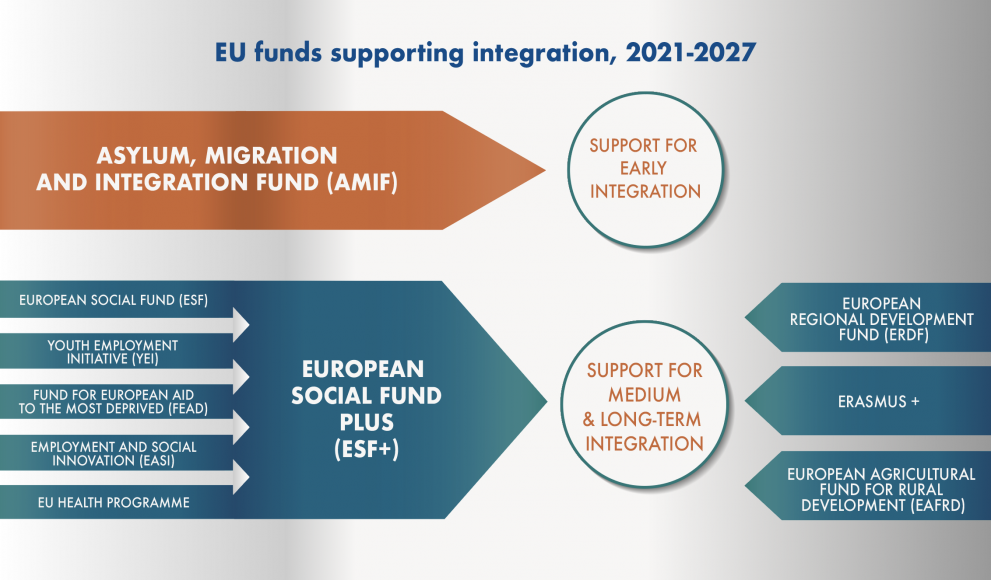EU funds are regulated by the EU's multiannual financial framework (MFF) which defines the implementation of the EU budget over 7-year periods. The European Commission (EC) announced proposals for the current 2021-2027 MFF in spring 2018, and the different funding programmes for the current period were subsequently approved in 2020 and 2021.
The EU countries have prepared national programmes under the different EU funds for the 2021-2027 period. These programmes set the countries' specific spending priorities. The programmes already launched are accessible via the EWSI national-level funding page.
The 2021-2027 funds: what’s key in terms of integration?

At the start of the current period, EU funds were streamlined and integration support became more readily available than before. In addition, the so-called partnership principle - or the push to involve regional and local authorities as well as civil society in programme planning and implementation - has been reinforced. The meaningful restructuring of EU funds for the 2021-2027 period is especially important, as EU financing remains the only resource available to support integration initiatives and policies in some of the EU countries.
The Asylum, Migration and Integration Fund (AMIF)
The Asylum, Migration and Integration Fund (AMIF) has seen a marked increase in the amount of funding available: for 2021-2027, the fund amounts to €9.9 billion, compared to €3.137 billion over the previous 2014-2020 period.
AMIF contributes to strengthening the common European asylum policy, developing legal migration in line with EU countries’ economic and social needs, supporting the integration of third-country nationals (TCNs), and tackling irregular migration.
The fund is mostly administered through the EU countries’ national programmes which address their specific needs. Additionally, in a new effort to involve local authorities, funding can also be allocated to local and regional authorities implementing integration support measures. On the other hand, the part of the fund that is directly managed by the EC allows for the financing of transnational projects.
AMIF is managed by the EC’s Directorate-General Migration and Home Affairs (DG HOME) – read more details about the 2021-2027 AMIF priorities.
The European Social Fund Plus (ESF+)
The European Social Fund Plus (ESF+), with a budget of over € 95.8 billion billion for the 2021-2027 period, is the EU’s main instrument for investment in building a more social and inclusive Europe. It is a key source of financing for medium- and long-term integration initiatives created to support employment and contribute to a fair and socially inclusive society.
ESF+ is important for integration stakeholders as EU countries are required to allocate at least 25% of their resources to promoting social inclusion. In particular, the fund’s Employment and Social Innovation (EaSI) strand promotes social protection and inclusion, fair working conditions and improved labour market access and mobility. Read more about ESF+.
Other funds and programmes supporting integration in 2021-2027
- The European Regional Development Fund (ERDF) supports effective and inclusive employment, education, skills-building, social inclusion and equal access to healthcare through dedicated national or regional programmes.
- The European Agricultural Fund for Rural Development (EAFRD) is dedicated to the balanced development of rural economies and communities, including the creation and maintenance of new jobs.
- The European Maritime and Fisheries Fund (EMFF) supports coastal communities in diversifying their economies. The fund finances projects that create new jobs and improve the quality of life.
- The Citizens, Equality, Rights and Values programme (CERV) recognises the importance of funding to protect core EU values and fundamental rights, to support civil society organisations and to sustain open, democratic and inclusive societies.
- The Erasmus+ programme supports education, training, youth and sport in Europe. Its total funds have doubled for the 2021-2027 period. The programme focuses on social inclusion, the green and digital transitions, and promoting young people’s participation in democratic life.
- The European Solidarity Corps (ESC) supports young people to address societal and humanitarian challenges through volunteering or by setting up their own solidarity projects. A key focus is the promotion of inclusion and diversity.
